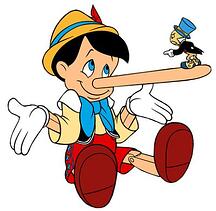 I understand the temptation to lie. If you're a small company, you want people to think your big. If you don't have experience, you want people to thing you do. If your big and bureaucratic you want people to think you're quick and responsive.
I understand the temptation to lie. If you're a small company, you want people to think your big. If you don't have experience, you want people to thing you do. If your big and bureaucratic you want people to think you're quick and responsive.
Okay, let's not call it lying. Let's call it stretching the truth when positioning our company or selling proposition.
Whatever you call it, I encourage you not to do it.
You create three critical problems when you do this:
1. You position yourself to your weakness. If you're small, and you talk and sell like you're big, you're giving credence to your customer that big must matter.
A few years ago I was discussing a potential large engagement with a prospect. They asked me if I had international experience. Half of their revenue came from outside the US, so it was a legitimate question. I was tempted to, how shall I put this, shade the truth. I thought about saying yes, justifying it by the fact that companies that I'd worked with did have international divisions. I thought about talking around the subject, hoping they wouldn't notice. Instead I just said, "No, I don't." A minute later the COO on the call, asked the CEO on the call, did international experience really matter for the problem they were trying to solve. The CEO responded that it wasn't.
What if the opposite were true? What if international expertise did matter? The reality is that if I had shaded the truth, I would have either lost the business because the moment they started asking me about international issues, but inexperience would have shown. Or, even worse, I would have still won the business, only to let the customer down later.
2. You diminish your people.
While I've met many salespeople who've lied, I've yet to meet a quality salesperson who enjoys it. Look, I've, umm, stretched the truth in my day in selling. Frankly, it was the part of the job that always made me feel a little dirty. It's probably one of the reasons that I ended up running my own business. If you're telling your salespeople to tell people you've got lots of experience when you don't, that you've got massive buying power when you're buying power is merely good, you telling your people that your company is not good enough to win business fairly. You erode their confidence, and confidence is the MOST important component to making sales.
3. The opportunity cost will kill your business
Probably the biggest cost to lying is that when you play to your weaknesses, you steal from the time to build your strengths. Every advantage is the seed of a disadvantage, and every disadvantage is the seed of an advantage. If, instead of positioning around your weakness, you found ways to exploit your strengths and to find the prospects who value those strengths (instead of valuing your weaknesses) you experience faster growth, lower sales costs and greater margins.
Plus, you'll feel good about how you're growing.

 Doug Davidoff
Doug Davidoff